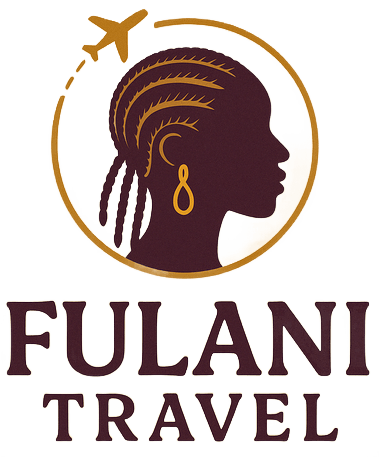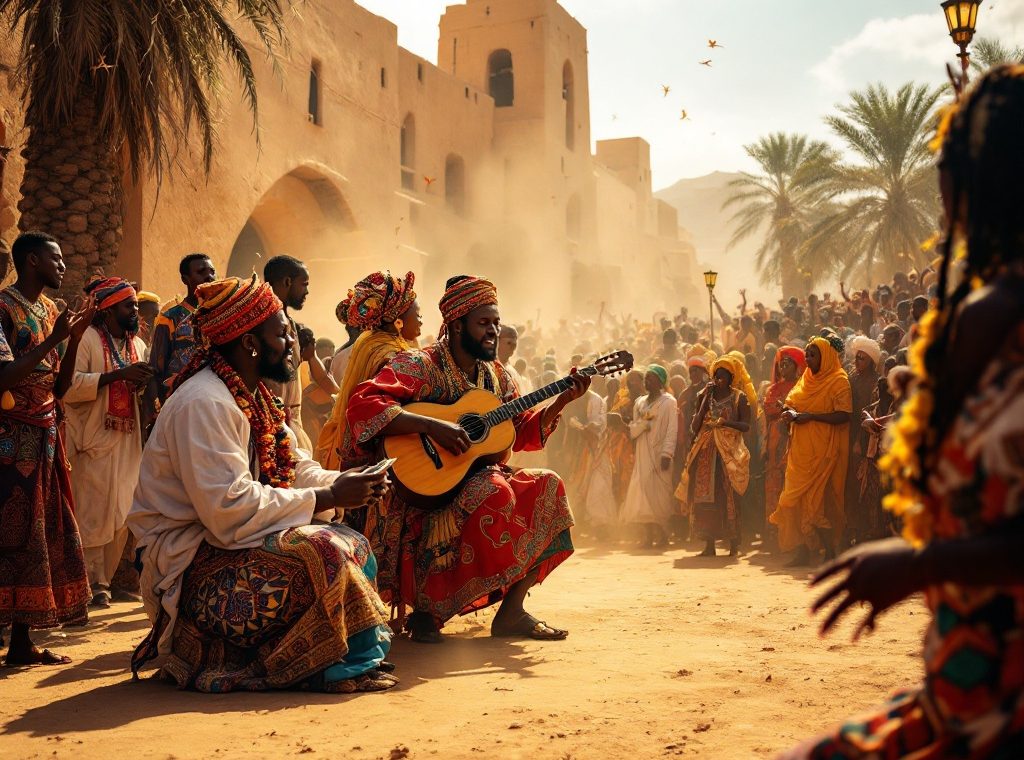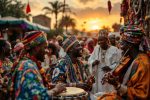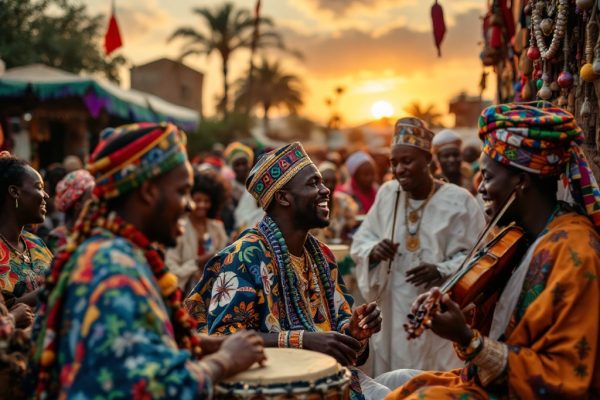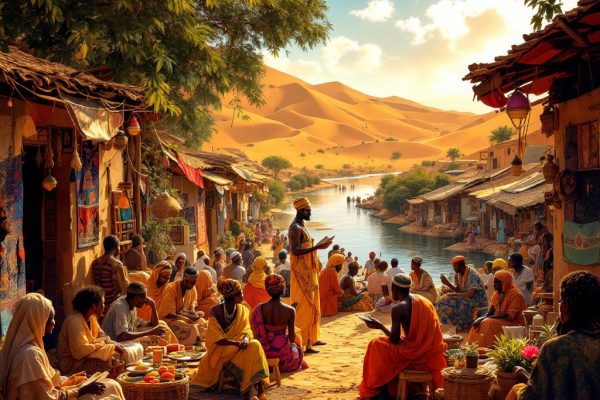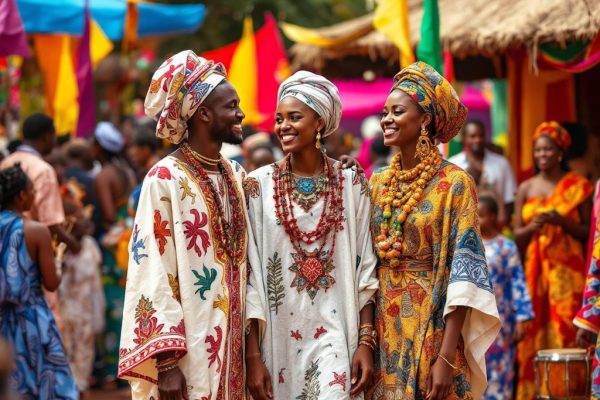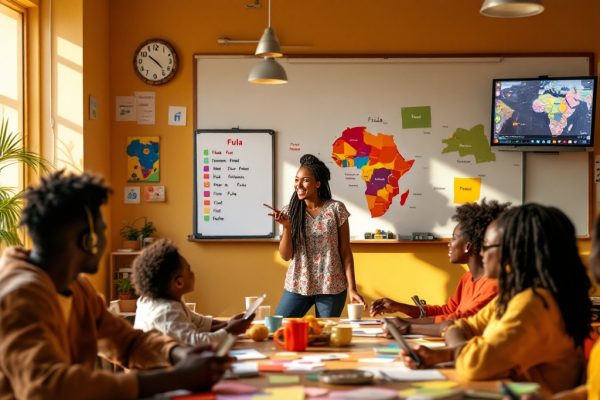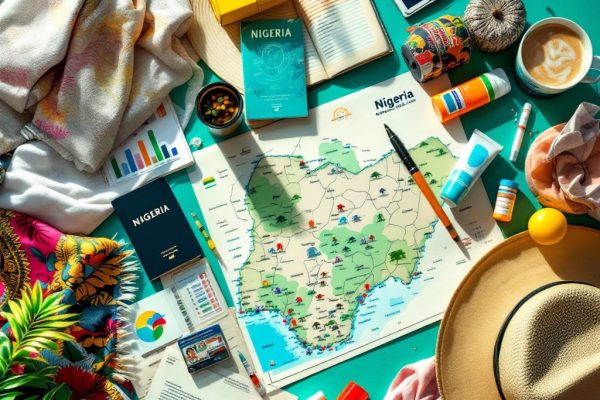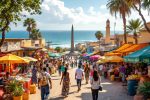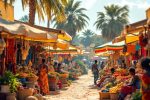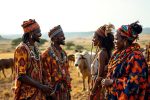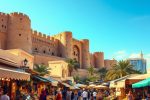Niger People and Culture: Customs, Languages, and Social Life
Discover the vibrant heart of West Africa! Niger, a landlocked nation, pulsates with a rich cultural heritage shaped by diverse ethnic groups like the Hausa, Zarma-Songhai, Tuareg, and Fulani. From ancient animist beliefs to the profound influence of Islam, explore a captivating blend of traditions. Uncover the power of griots, the keepers of Niger’s oral history, and witness the spectacle of festivals like Cure Salée and Guérewol. Journey through Niger’s linguistic landscape, where over 21 languages paint a vivid tapestry of communication. Explore this fascinating country’s story – click to delve deeper into Niger’s captivating culture.
Important information
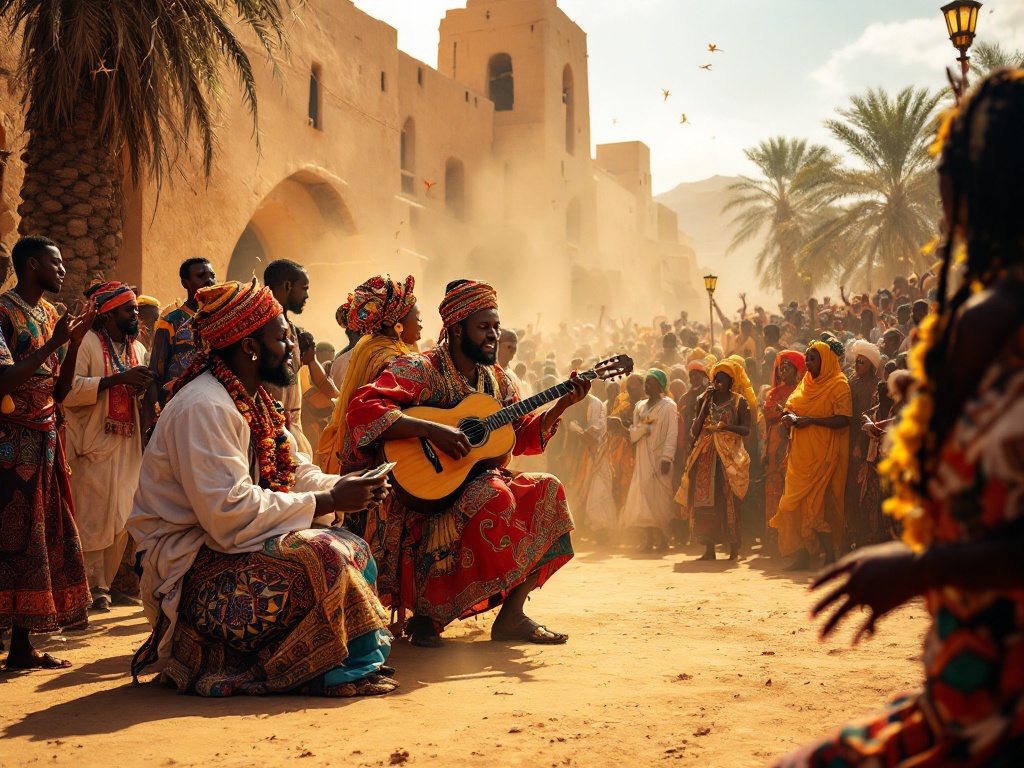
- Niger is a West African country with a diverse population, primarily composed of the Hausa (55.4%), Zarma-Songhai (21%), Tuareg (9.3%), and Fulani (8.5%) ethnic groups.
- Islam is the dominant religion (over 99%), coexisting with animist beliefs and practices like the Bori cult.
- French is the official language, but over 21 languages are spoken, including Hausa (the most prevalent), Zarma, and others. The government recognizes ten national languages.
- Nigerien culture is rich in traditions, including communal meals, respect for elders, vibrant festivals (Cure Salée, Guérewol), oral storytelling by griots, and traditional crafts.
- A nomadic heritage is preserved, particularly by the Tuareg, with traditions like caravan trade and sports such as horse and camel racing, alongside the popular sport of Sorro wrestling.
Niger: A Landlocked Country with a Rich Cultural Heritage
Niger, a West African nation, is a vibrant tapestry of ethnic groups, each contributing to its rich cultural heritage. This heritage is interwoven with a complex social structure, deeply rooted in traditional hierarchies of age, gender, and class. The nation’s history is marked by hardship, from ecological disasters and economic struggles to political instability. These challenges have profoundly shaped Niger’s unique cultural landscape, influencing its traditions and social interactions. Niger’s story is one of resilience in the face of adversity.
Ethnic Groups and Population Distribution
Niger is a country with a diverse ethnic landscape. The Hausa are the largest group, representing 55.4% of the population. The Zarma-Songhai constitute 21%, followed by the Tuareg at 9.3% and the Fulani (Peul) at 8.5%. The Kanuri make up 4.7%, with smaller groups like the Toubou, Arabs, and Gurma adding to the nation’s rich cultural mix.
Hausa: The Predominant Group
The Hausa people, making up 53% of Niger’s population, heavily influence the country’s identity with their rich culture.
Zarma-Songhai: Significant Ethnic Presence
The Zarma-Songhai people constitute a substantial portion of Niger’s population, representing 21%. Their vibrant culture significantly contributes to the nation’s diverse heritage.
Fulani and Tuareg Tribes
The Fulani, comprising 10% of Niger’s population, are deeply tied to their heritage. The Tuareg, who also make up 10% of the population, are renowned for their nomadic lifestyle and crucial role in the caravan trade. Both groups, though distinct, significantly enrich Niger’s vibrant cultural landscape.
Kanuri and Other Ethnic Minorities
The Kanuri people make up 4.4% of Niger’s population, representing just one aspect of the nation’s diverse cultural heritage. This rich cultural diversity is fundamental to Niger’s identity.
Cultural Diversity and National Identity
Niger’s national identity is a vibrant tapestry woven from many ethnic groups, including the Hausa, Zarma-Songhai, Fulani, Tuareg, and others. Islam, introduced centuries ago, now intertwines with ancient traditions, shaping beliefs, rituals, and social structures into a unique cultural blend. This fusion respects both past and present. Elders and griots, the storytellers and oral historians, play a vital role in preserving Niger’s heritage, strengthening the nation’s shared identity and connecting its diverse communities.
Integration of Various Ethnic Groups
Niger’s diverse population encompasses various ethnic groups, including the Hausa, Zarma-Songhai, Fulani, Tuareg, Kanuri, and others, who largely coexist peacefully. This peaceful coexistence creates a rich cultural landscape, blending shared traditions often rooted in both Islamic and pre-Islamic beliefs, fostering a sense of national unity. Despite existing ethnic differences, community elders and griots play a crucial role in preserving and transmitting cultural knowledge, which strengthens social bonds. Nigeriens also celebrate diverse art forms, such as music, dance, and storytelling, further promoting cultural integration.
Influence of Islamic and Pre-Islamic Elements
Nigerien culture is a captivating fusion of Islamic and pre-Islamic traditions. Islam, the dominant religion, shapes numerous customs, while older practices continue to flourish, creating a distinctive cultural tapestry. This blend showcases Niger’s remarkable religious tolerance. Although Islam’s influence is evident in daily life and rituals, indigenous beliefs remain deeply ingrained. This is reflected in ceremonies and celebrations, which often weave together elements of both faiths. This integration is fundamental to Nigerien identity, demonstrating a harmonious coexistence of diverse belief systems.
Role of Elders and Griots in Society
In Niger, elders are deeply revered, their wisdom and experience guiding the community. They preserve knowledge and cultural heritage, playing a vital role in Nigerien society. Griots, the storytellers and musicians, are equally important. Through songs, poems, and narratives, they maintain a vibrant oral tradition, transmitting cultural knowledge and reinforcing social norms across generations. This ensures that history lives on.
Languages in Niger
French is the official language of Niger, used in government, education, and media. However, Niger has a rich linguistic diversity, with over 21 languages spoken throughout the country. Hausa is the most commonly spoken language, used by over half of the population. Other prominent languages include Zarma, Songhay, Fulfulde, and Tamasheq. Multilingualism is common, with many Nigeriens fluent in their native language, Hausa, and French. The Nigerien government officially recognizes ten national languages: Arabic, Buduma, Fulfulde, Gourmanchéma, Kanuri, Zarma, Songhay, Tamasheq, Tassawaq, and Tebu.
Official Language: French
French is the official language of Niger, playing a crucial role in government, education, and commerce. Its impact is deeply ingrained in Nigerien society.
Hausa Language and Its Prevalence
Hausa is the dominant language in Niger, spoken by over half the population. This prevalence makes it a crucial tool for bridging communication between the country’s diverse ethnic groups, fostering connection and understanding.
Zarma/Songhai and Other National Languages
Niger’s diverse linguistic landscape encompasses several recognized national languages. These include Zarma/Songhai, Hausa, Fulfulde, Tamajaq, Kanuri, Arabic, Buduma, Gourmanchéma, Tassawaq, and Tebu. Each language contributes to the nation’s rich cultural tapestry. While French remains the official language, Zarma stands out as the most commonly spoken, used by 21% of the population.
Language Diversity: Over Twenty-One Languages
Niger boasts remarkable linguistic diversity, with over 21 languages spoken throughout the country. While Hausa is the dominant language, spoken by more than half the population, other prevalent languages contribute to this rich tapestry. These include Zarma, Songhay, Fulfulde, and Tamasheq. Multilingualism thrives in Niger, with many citizens conversant in several languages. French is also common, particularly among those educated in the Western tradition. Officially, the government recognizes ten national languages.
Religion and Spiritual Beliefs
Islam is the dominant religion in Niger, with the majority of the population adhering to the Muslim faith. Key Islamic holidays such as Eid al-Fitr and Eid al-Adha are widely observed. However, animist beliefs are still prevalent, especially in rural communities. The Bori cult is a prime example of the syncretism between Islam and traditional animism, reflecting the enduring influence of spirit worship in Nigerien culture. This spiritual dimension plays a significant role in daily life and rituals, as many people seek blessings for health, prosperity, and protection.
Islam: The Major Official Religion
Islam is the dominant religion in Niger, with over 99% of the population adhering to the faith. Most Nigeriens are Sunni Muslims, primarily following the Maliki school of Islamic law. Sufi orders, especially the Tijaniyya and Qadiriyya, also hold significant influence. Islam’s impact is woven into the fabric of daily life, shaping social customs, influencing the legal system, and permeating cultural events.
Animism and the Bori Cult
Niger’s spiritual landscape is richly diverse. Animism, a belief system that imbues natural elements like trees, rocks, and rivers with profound spiritual meaning, is widely practiced. Another prominent tradition is the Bori cult, an indigenous religion intertwining animism with spirit possession and emphasizing ritual practice. These rituals, often featuring trance-like states, are guided by practitioners seeking connection and appeasement with the spirits. Bori’s influence extends beyond ceremonial practices, playing a significant role in healing and community life. Remarkably, both animism and Bori coexist alongside Islam, Niger’s predominant faith.
Belief in Spirits and Folklore
In Niger, spirits wield significant influence over people’s lives and destinies. This belief system is deeply interwoven with the Islamic faith, resulting in a unique blend of religious practices. Many Nigerien Muslims venerate both Allah and traditional spirits, conducting rituals to solicit their assistance. These ceremonies may involve requests for success in examinations, safe travels, or blessings of prosperity and health.
Social Life and Customs
Nigerien culture places a strong emphasis on communal dining, symbolizing hospitality and close community ties. Rites of passage, such as the *kishakish* ritual, mark significant life events within their social structure, influenced by age, gender, and social standing. Marriage customs, especially, highlight the importance of family, reflecting fundamental Nigerien values.
Communal Meals and Hospitality
Meal sharing in Niger is deeply rooted in their culture, symbolizing hospitality and strengthening bonds between individuals. This cherished tradition reflects a genuine appreciation for communal experiences.
Age, Gender, and Social Class Structures
In Niger, respect is deeply tied to age, with elders holding influential societal positions. This cultural cornerstone is complemented by traditional gender roles that define expectations and responsibilities. Social hierarchies, shaped by lineage, occupation, and religious affiliation, further influence an individual’s standing. These interconnected customs profoundly affect community interactions. Nigerien society values the wisdom and experience of its elders, granting them significant authority in decision-making processes. Traditional gender roles often see men as public figures and women as keepers of the home, though variations exist across different communities. Lineage, occupation, and religious affiliation add further layers to the social structure, influencing access to resources and opportunities. Ultimately, these interwoven cultural elements shape the dynamics of community life in Niger.
Rites of Passage: The _kishakish_ Ritual
In Niger, the kishakish celebrates a newborn’s arrival six days after birth. This important rite of passage formally introduces the infant to the community, signifying their integration into society.
Marriage Customs and Family Life
Niger’s diverse marriage traditions vary significantly across its ethnic groups, including the Hausa, Zarma, Fulani, and Tuareg. Each group boasts unique customs, but family, often extending beyond the immediate members, plays a central role throughout Nigerien society. Traditional gender roles are typical, and arranged marriages remain a common practice. Among these customs, the _kishakish_ ritual stands out, marking a young girl’s important transition to adulthood.
Festivals and Cultural Events
Niger’s cultural calendar is rich with vibrant celebrations. One notable event is the Cure Salée festival, marking the end of the rainy season with music, dance, and a symbolic salt exchange between herders and farmers. The Guérewol, a Wodaabe courtship ritual, sees men competing in elaborate beauty contests judged by women. Islamic holidays also hold a central place in Nigerien culture.
Cure Salée Festival: Celebrating the End of the Rainy Season
Niger’s Wodaabe Fula people celebrate the vibrant Cure Salée festival, marking the end of the rainy season with exuberant music, energetic dances, and captivating cultural displays. This significant event is a beautiful showcase of Wodaabe traditions.
Guérewol Festival: A Celebration of Beauty and Dance
The Wodaabe Fula people of Niger celebrate a unique courtship ritual called Guérewol. During this festival, young men adorn themselves with elaborate costumes and makeup to attract the attention of women. They perform Yaake dances and songs, emphasizing their height, bright white teeth, and expressive eyes. The women carefully observe these mesmerizing displays, selecting partners based on their performances. Guérewol often leads to marriages, preserving a vibrant tradition of love and choice.
Major Holidays and Islamic Celebrations
Niger celebrates both Islamic and secular holidays. Key Islamic observances include Eid al-Fitr, Eid al-Adha (Tabaski), and Mawlid (the Prophet Muhammad’s birthday). Tabaski, commemorating Abraham’s willingness to sacrifice his son, involves festive meals and the ritual sacrifice of a ram. Niger also celebrates secular holidays such as Republic Proclamation Day on December 18th and Independence Day on August 3rd.
The Arts and Crafts of Niger
Niger’s vibrant culture shines through its diverse traditional crafts. Skilled artisans create exquisite leather goods, pottery, textiles, and intricately carved wooden objects, showcasing the country’s rich artistic heritage. Music and dance play a vital role, entertaining communities while narrating stories and transmitting traditions. Oral literature, including proverbs, folktales, and epic poems, is passed down through generations, preserving Niger’s cultural memory.
Traditional Crafts and Skilled Craftspeople
Nigerien artisans are celebrated for their expertise in various crafts. These include leatherworking, pottery, weaving, and metalworking. They create intricate designs for both decorative and functional pieces. These range from handcrafted jewelry and woven textiles to finely crafted leather goods. These time-honored traditions are often passed down through generations. They are integral to Niger’s rich cultural heritage.
Music and Dance as Forms of Entertainment
Nigerien music vibrates with a mix of ancient traditions and modern rhythms. Storytelling is at the heart of traditional music among the Hausa and Tuareg, often accompanied by unique instruments. In urban centers, young people enjoy popular genres like pop, rock, and hip hop. Dance is an integral part of Nigerien celebrations, from weddings energized by African pop to spirit possession ceremonies captivating large audiences.
Traditional Music
Storytelling forms the core of Hausa and Tuareg music, often using distinctive instruments.
Modern Music
Urban youth embrace popular genres such as pop, rock, and hip hop.
Dance plays a vital role in Nigerien celebrations, ranging from weddings with African pop to captivating spirit possession ceremonies.
Oral Literature and Storytelling Traditions
In Niger, oral traditions play a vital role in preserving the nation’s history and cultural values. These traditions manifest in various forms, including folk tales, legends, heroic epics, and ritualistic chants. The country’s high illiteracy rate further underscores the importance of these spoken narratives. While written literature is a relatively recent development, oral literature remains essential for ensuring cultural continuity across generations. For instance, stories passed down through spoken word embody Niger’s rich heritage, strengthening community bonds and fostering a shared identity. This powerful oral tradition safeguards Niger’s cultural legacy for years to come.
Niger’s Nomadic Heritage and Traditional Practices
For centuries, Tuareg caravans served as the backbone of trans-Saharan trade, transporting essential commodities like salt, gold, and textiles across the harsh desert.
Camel and horse racing are deeply woven into Nigerien culture, often taking center stage at festivals and celebrations. Sorro wrestling, a beloved sport, also holds a significant position, showcasing strength, skill, and captivating athleticism.
Tuareg Caravans and Trade
Across the Sahara’s sands, Tuareg men continue their ancient caravan tradition, a cornerstone of Niger’s nomadic culture and a vital link to its rich past.
Traditional Sports: Horse and Camel Racing
Horse and camel racing are deeply woven into Niger’s nomadic traditions and cultural fabric. These exhilarating sports often feature prominently in festivals like Cure Salée, which celebrates the end of the rainy season. Camel racing, a particular highlight, transforms these events into vibrant social gatherings that strengthen communities and reinforce Nigerien identity.
Sorro Wrestling and Other Competitions
Sorro wrestling holds a special place in Niger’s cultural heritage, particularly in the countryside. While camel and horse racing are important traditions, football dominates the modern sporting scene. Niger also proudly sends athletes to compete in prestigious global events like the Olympic Games.
